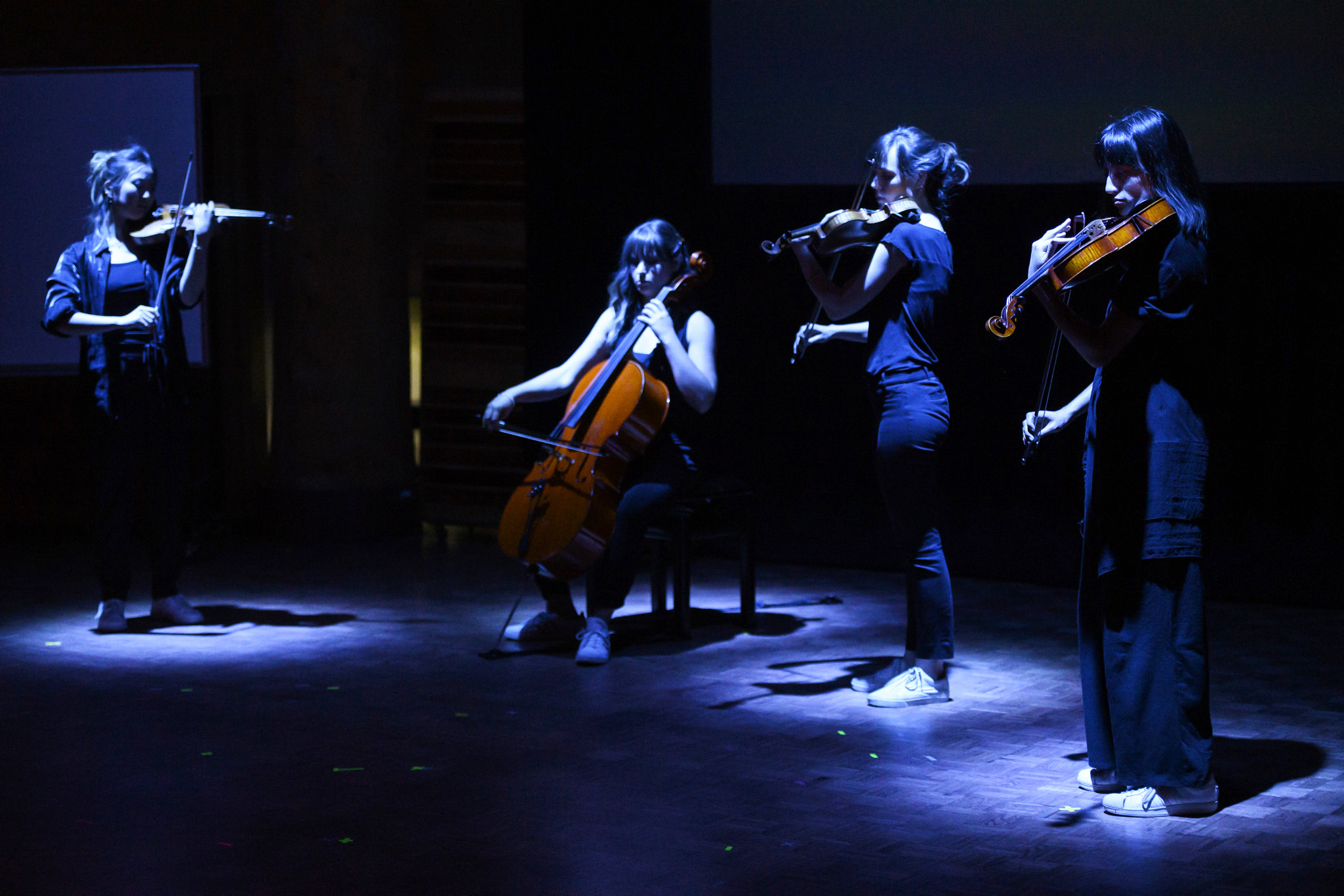
Quartet 121 Molly Germer, violin I (U.S.A.), Thea Mesirow, cello (U.S.A.), Julia Un Suh, violin II (U.S.A.), Lena Vidulich, viola (U.S.A.). Photo by Donald Lee.
Message from Artistic Director
We are so pleased to welcome you back to Sacred Buffalo Guardian Mountain, for summer performances at Banff Centre.
It is with great excitement that summer music residency programs return to Banff National Park this year, under the leadership of Annalee, Jamie and Roman from Canada’s renowned Gryphon Trio. While the Covid-19 pandemic has impacted artists and arts organizations across the land, the Gryphon Trio and their supporting faculty and staff have expertly convened an esteemed, international cohort that will include artistic exchange, collaboration, shop talk, concerts, and no doubt some mischief.
We thank our many supporters who help make it possible for these artists to benefit from a rich Banff Centre experience. If we ever took arts crowds for granted before Covid prevented us from gathering, we never will again in our lifetimes.
Lastly: we hope you can pardon the construction outside this summer as the redesigned pathway takes shape up St. Julien Road to the campus. It’s about to look better than ever!
~ Nathan Medd, Managing Director, Performing Arts
About the Program
Join us for two concert highlighting mentors from the Evolution: Quartet program and six participant concerts showcasing Banff Centre’s long history with one of the pillars of western classical music – the string quartet. Having mentored with the Eybler, Parker and JACK Quartets, musicologist Suzannah Clarke, and composers Suzanne Farrin and Felipe Lara, six participant quartets and six composers reveal the results of their intensive Evolution: Quartet residency experience. Engaged in discussions focused on historically informed practices, new contemporary techniques, intonation, harmony, structure and rhetoric, instrumentalists come away with new depth, dimension and clarity of intent. Challenged and inspired by faculty and participant ensembles, early career composers offer new inspiring works for your consideration.
This house program highlights the artists and faculty who are here for the duration of the Evolution: Quartet program and concerts. To find out specific program repetoire and curation, please check out each individual concert event.
Tuesday, July 19 in the Rolston Recital Hall:
Artistic Producers — Margaret Jordan-Gay & Caroline Hollway
String Quartet in D minor, K. 421 | Wolfgang Amadè Mozart (1756-1791) — Eybler Quartet; Julia Wedman, violin; Patricia Ahern, violin; Patrick Jordan, viola; Margaret Gay, violoncello
i) Allegro moderato
ii) Andante
iii) Menuetto - Allegretto. Trio
iv) Allegro ma non troppo
Three Madrigals (1947) | Bohuslav Martinů (1890 - 1959) — Daniel Chong, violin; Jessica Bodner, viola
i) Poco allegro
Divertimento in E flat major, K. 563 | Wolfgang Amadè Mozart (1756-1791) — Julia Wedman, violin; Jessica Bodner, viola; Jay Campbell, cello
i) Allegro
ii) Adagio
iv) Andante
INTERMISSION
String Creatures (2022) | Liza Lim (b.1966) Preview Performance — JACK Quartet; Christopher Otto, violin; Austin Wulliman, violin; John Pickford Richards, viola; Jay Campbell, cello
1. Cat's Cradle (3 diagrams of grief)
2. Untethered
3. A nest is woven from the inside out
String Creatures is co-commissioned by the Lucerne Festival, Miller Theatre at Columbia University and the Melbourne Recital Centre dedicated to the JACK Quartet.
**Premiere: August 14, 2022, KKL Luzern, Lucerne Festival
Repertoire from previous concerts can be found on the corresponding event page.
July 12 - Evolution: Quartet — Sonic Pillars and Contrasts
This program is generously supported by the Maria Francisca Josepha Brouwer Fund for Dutch Artists, Alice & Betty Schultz Endowment Fund, Cyril & Elizabeth Challice Teaching Fellowships in Music, Yolande Freeze Master Artists in Music Fund, Peter & Sheila Bentley Distinguished Guest Artist, and The Gryphon Trio.
Additional Messages
Welcome!
We are thrilled to welcome you to the Banff Centre campus for this summer’s Evolution: Quartet faculty and program concerts. The string quartet has long been an essential element of the Banff Centre echo system and the absence of chamber music in the Bow Valley
for the last two years has been deeply felt. The work that you witness and the sounds you will hear will amplify a resonance initiated earlier this summer by participants in the Evolution: Classical program, and will signal a glorious end to a two-year period of eerie silence.
The Evolution: Quartet program brings together a unique and powerful faculty with a brilliant cohort of international participants that will collectively explore the entire lineage of string quartet genre. While on one hand expanding and enriching their capacity to interpret and perform music from previous centuries, quartets will collaborate with composers to create, hone and bring to life music made in our time. All of this to be shared with you, over the course eight concerts from July 12 - July 25.
If this is your first time venturing into Banff Centre summer music, welcome. We are thrilled to have you join us for this golden summer at the Banff Centre!
~ Annalee Patipatanakoon, Roman Borys, Jamie Parker — Directors, Banff Centre Summer Music Classical Programming
About the Company
Production Staff:
Brendan Briceland - Head of Projection
Brett Rayner - Head Stage Carpenter
Raj Rathore - Assistant Head Stage Carpenter
Lyle Fish - Head of Sound
Charles Culver - Assistant Head of Sound
Matt Flawn - Head of Lighting
Darrell Shaw - Assistant Head of Lighting
Juan Anez - Omni Technician
Albert Picknell - Head Piano Technician
Henry Ng - Audio and Music Technician
Genevieve Nevin-Jones - Production Coordinator
Chaz Anderson - Production Coordinator
Samantha Hindle - Technical Director
Bronwyn Bowlby - Assistant Production Manager
Woody MacPhail - Senior Technical Producer
James Clemens-Seely - Senior Recording Engineer
Jeff Kynoch - Recording Engineer
Jen Chiasson - Lead Video Technician
Darcy Locke - Maintenance Technologist Video
Raffi Tchalikian - Technical Support
Nathan Medd - Managing Director, Performing Arts
Jake Tkaczyk - Program Manager, Performing Arts
Nate Spasiuk - Program Delivery Specialist
Biographies
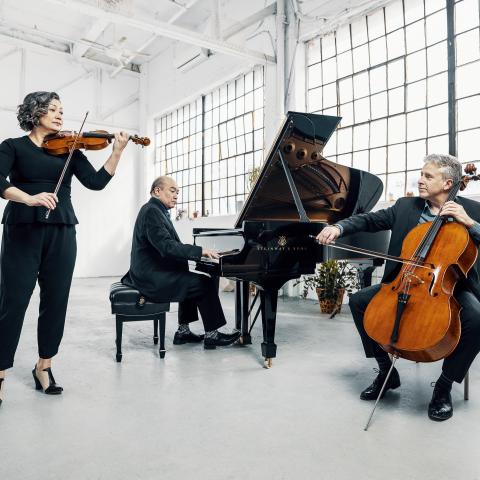

Celebrating its 30th season, the Gryphon Trio is one of the world’s preeminent piano trios, garnering acclaim and impressing international audiences with its highly refined, dynamic and memorable performances.
With a repertoire that ranges from traditional to contemporary and from European classicism to modern-day multimedia, the Gryphons are committed to redefining chamber music for the 21st century.
Creative innovators with an appetite for discovery and new directions, the Gryphon Trio has commissioned over 100 new works, and frequently collaborates on projects that push the boundaries of chamber music. The trio tours regularly throughout North America and Europe, and their 22 recordings are an encyclopedia of works for the genre. Honours include three Juno Awards for Classical Album of the Year – most recently, that of 2019 – and the prestigious 2013 Walter Carsen Prize for Excellence in the Performing Arts from the Canada Council.
Deeply committed to music education and audience development, the Gryphons conduct master classes and workshops at universities and conservatories, and are artists-in-residence at the University of Toronto’s Faculty of Music and Trinity College. Dr. Jamie Parker is the Rupert E. Edwards Chair in Piano Performance and Annalee Patipatanakoon is Associate Professor of Violin and Head of Strings at the University of Toronto’s Faculty of Music.
Since 2010, the trio’s multi-faceted arts creation program Listen Up! has engaged elementary school students, teachers and parents in 16 Canadian communities and provided them with the experience and knowledge required to participate actively in the arts.
The Gryphon Trio has had a long association with the Ottawa Chamberfest – Roman Borys served as Artistic Director between 2007-2015, as Artistic and Executive Director between 2015-2021 and Patipatanakoon and Parker served as Artistic Advisors between 2008-2021. The Trio are currently Directors of Classical Music Summer programs at Banff Centre for Arts and Creativity.
Directors of Summer Classical Music
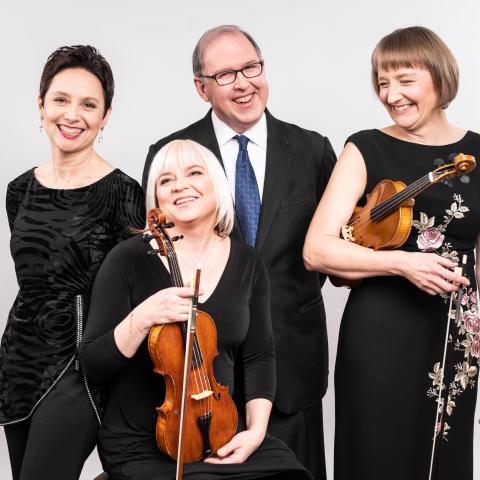

The Eybler Quartet came together in late 2004 to explore the works of the first century and a half of the string quartet, with a healthy attention to lesser known composers such as their namesake, Joseph Leopold Edler von Eybler. The group brings a unique combination of talents and skills: razor-sharp ensemble skills, technical prowess, expertise in period instrument performance and an unquenchable passion for the repertoire. The Toronto- based ensemble’s live performances have consistently garnered praise as “glowing and committed”, “spirited” and “lively and energizing”. Their recording of Joseph Haydn’s Op. 33 String Quartets for the Analekta label was called “simply a treasure” by Early Music America, “the tempos are beautifully chosen, the ensemble perfect, and the intonation absolutely pure. This is music-making that reflects the deeply human and attractive qualities found in Haydn the composer—good humor, wit, and invention.” Their recording with clarinetist Jane Booth won praise from Gramophone for being “totally engaging performances that breathe life into Backofen’s music”. Their Beethoven Quartets, Opus 18 nos. 1-3 garnered this praise from Gramophone: “…the revelations flood in: the swiftness with which the Eyblers take the great Adagio of Op 18 No 1 allows violinist Aisslinn Nosky’s almost vibrato-free period-instrument tone to sound breathtakingly fragile.” Violinists Julia Wedman and Patricia Ahern, and violist Patrick G. Jordan are members of Tafelmusik Baroque Orchestra. Cellist Margaret Gay is much in demand as both a modern and period instrument player. This summer the group will again be on the faculty at the Banff Centre as part of the EQ: Evolution of the String Quartet program.
In September 2022 Patricia Ahern joined the group, replacing founding member Aisslinn Nosky.
Faculty
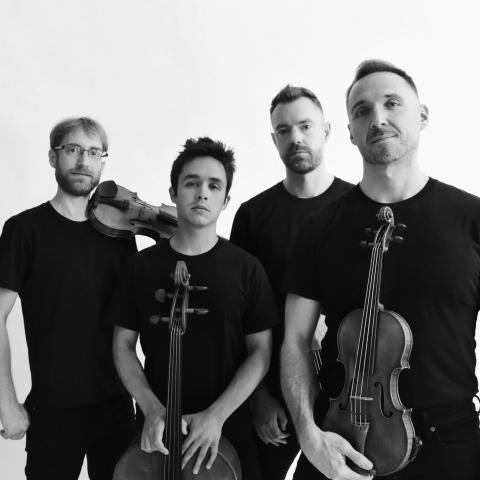

Hailed by The New York Times as “our leading new-music foursome”, the JACK Quartet is one of the most acclaimed, renowned, and respected experimental string quartets performing today. Comprising violinists Christopher Otto and Austin Wulliman, violist John Pickford Richards, and cellist Jay Campbell, JACK operates as a nonprofit organization dedicated to the performance, commissioning, and appreciation of new string quartet music. The quartet was selected as Musical America’s 2018 “Ensemble of the Year”, nominated for GRAMMY Awards for recordings in 2018 & 2022, named to WQXR’s “19 for 19 Artists to Watch”, and awarded an Avery Fisher Career Grant, as well as the Fromm Music Foundation Prize.
Through intimate relationships with today’s most creative voices, JACK embraces close collaboration with the composers they perform, leading to a radical embodiment of the technical, musical, and emotional aspects of their work. The quartet has worked with artists such as Julia Wolfe, George Lewis, Helmut Lachenmann, and Caroline Shaw, with upcoming and recent premieres including works by John Luther Adams, Catherine Lamb, Liza Lim, Tyshawn Sorey, Wadada Leo Smith, Amy Williams, and John Zorn. JACK’s all-access initiative, JACK Studio, funds collaborations with a selection of artists each year, who receive money, workshop time, mentorship, and resources to develop new works for string quartet.
Committed to education, JACK is the Quartet in Residence at the Mannes School of Music, where they provide mentorship to Mannes’s Cuker and Stern Graduate String Quartet. They also teach each summer at New Music on the Point, a contemporary chamber music festival in Vermont for young performers and composers, and at the Banff Centre for Arts and Creativity. JACK has long-standing relationships with the University of Iowa String Quartet Residency Program, where they teach and collaborate with students each fall and spring, as well as with the Lucerne Festival Academy, of which the four members are all alumni.
Photo by Shervin Lainez
Faculty
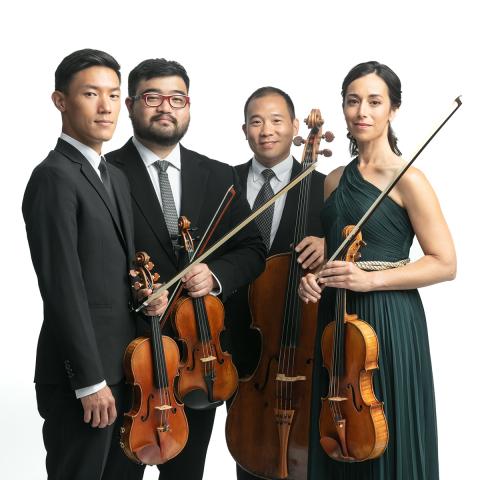

Daniel Chong, violin | Ken Hamao, violin | Jessica Bodner, viola | Kee-Hyun Kim, cello
Internationally recognized for their “fearless, yet probingly beautiful” (The Strad) performances, the Grammy Award-winning Parker Quartet has rapidly distinguished itself as one of the preeminent ensembles of its generation, dedicated purely to the sound and depth of their music. Inspired performances and exceptional musicianship are hallmarks of the Quartet, having appeared at the world’s most illustrious venues since its founding in 2002.
Recent seasons included performances around the United States and Europe, including Wigmore Hall, Konzerthaus Berlin, Music Toronto, Philadelphia Chamber Music Society, Strathmore, San Antonio Chamber Music Society, University of Chicago, the Schubert Club, and Kansas City’s Friends of Chamber Music.
This season the Quartet marks their 20th anniversary with The Beethoven Project, a multi-faceted initiative which includes performances of the complete cycle of Beethoven’s string quartets; the commissioning of six composers to write encores inspired by Beethoven’s quartets; the creation of a new video library spotlighting each Beethoven quartet; and bringing Beethoven’s music to non-traditional venues around the Quartet’s home base of Boston, including homeless shelters and youth programs.
The Quartet is committed to working with composers of today — recent commissions include works by Augusta Read Thomas, Felipe Lara, Jaehyuck Choi, and Zosha di Castri. Celebrating the process of creation, the Quartet recorded three new commissions by Kate Soper, Oscar Bettison, and Vijay Iyer as part of Miller Theatre’s Mission: Commission podcast.
Additionally, the Quartet regularly collaborates with a diverse range of artists, including pianists Menahem Pressler, Orion Weiss, Shai Wosner, Billy Childs, and Vijay Iyer; members of the Silk Road Ensemble; clarinetist and composer Jörg Widmann; clarinetists Anthony McGill and Charles Neidich; flutist Claire Chase; and violist Kim Kashkashian, featured on their recent Dvořák recording. The Quartet also continues to be a strong supporter of Kashkashian’s project Music for Food, participating in concerts throughout the United States for the benefit of various food banks and shelters.
Recording projects continue to be an important facet of the Quartet’s artistic output. Described by Gramophone Magazine as a ”string quartet defined by virtuosity so agile that it’s indistinguishable from the process of emotional expression,” their newest release for ECM Records features Dvořák's Viola Quintet as well as György Kurtág's Six Moments Musicaux and Officium breve in memoriam. The Strad also declared the album as “nothing short of astonishing.” Under the auspices of the Monte Carlo Festival Printemps des Arts, they recorded a disc of three Beethoven quartets, of which Diapason “admired the group’s fearlessness, exceptional control, and attention to detail.” The Quartet can also be heard playing Mendelssohn on Nimbus Records, Bartók on Zig-Zag Territoires, and the complete Ligeti Quartets on Naxos, for which they won a Grammy Award for Best Chamber Music Performance.
The members of the Parker Quartet serve as Professors of the Practice and Blodgett Artists-in-Residence at Harvard University’s Department of Music. The Quartet also holds a visiting residency at the University of South Carolina and spends its summers on faculty at the Banff Centre’s Evolution: Quartet program.
Founded and currently based in Boston, the Parker Quartet’s numerous honors include winning the Concert Artists Guild Competition, the Grand Prix and Mozart Prize at France’s Bordeaux International String Quartet Competition, and Chamber Music America’s prestigious Cleveland Quartet Award.
Photo by Beowulf Sheehan
Faculty
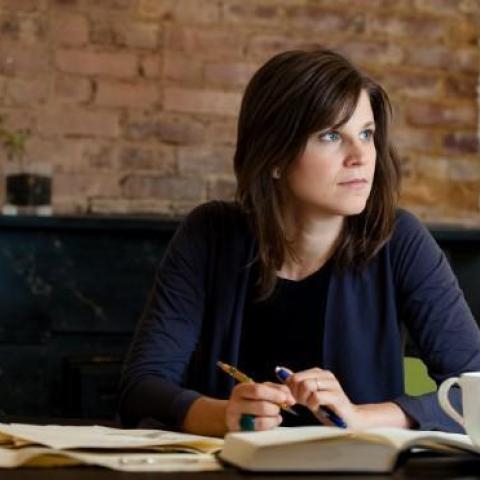

Suzanne Farrin is a composer whose works have been performed around the world. Anthony Tommasini of the New York Times called her first opera, dolce la morte, a work of “shattering honesty.” Her debut recording, Corpo di Terra, was described in Timeout Chicago, “like field recordings from inside the cerebral cortex.” Recent commissions include works for Talea Ensemble, The Library of Congress, Sō Percussion, JACK Quartet, and The International Contemporary Ensemble. She was a 2018 Rome Prize Winner and a 2020 Guggenheim Fellow in Composition.
In addition to composing, Suzanne is a performer of the ondes Martenot, an early electronic instrument created by the engineer Maurice Martenot in the 1920s as a response to the simultaneous destruction and technological advances of WWI. Her life as an interpreter on the instrument has taken her to venues such as the Abrons Arts Center in NYC, Centro de Artes in Buenos Aires, as well as film and television. She has performed in film scores such as Chicuarotes (Gael Garcia Bernal, director), Sade Ma’bar/Blockage (Mohsen Gharaie, director), and USERS (Natalia Almada, director), which was featured at the 2021 Sundance Film Festival. She appears as herself in an episode of the Amazon series Mozart in the Jungle (Roman Coppola, director).
Suzanne is the Frayda B. Lindemann Chair of Music at Hunter College and The C.U.N.Y. Graduate Center, where she teaches composition. She has been the lead mentor composer for Evolution: Quartet at the Banff Centre since 2021. She holds a doctorate in from Yale University. Her next opera, Macabéa, will be premiered at the Theatro São Pedro in São Paolo, Brazil in 2025 and is supported by the Siemens Foundation and the Consolate General of Brazil in New York.
Faculty
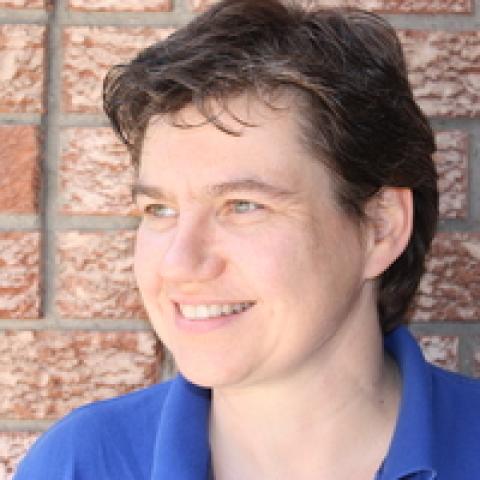

Suzannah Clark, AKC, BMus, MMus, MFA, MA, PhD, is Professor of Music at Harvard University. Before moving to Harvard in 2008, she taught at Oxford University for eight years. Clark specializes in the music of Franz Schubert, the history of music theory, and medieval music. Her book Analyzing Schubert was published by Cambridge University Press in 2011. Clark has given lectures in the UK, USA, Canada, France and Germany and has held fellowships from the Deutscher Akademischer Austausch Dienst (Germany), Social Sciences and Humanities Research Council (Canada), British Academy (UK), Arts and Humanities Research Council (UK). Most recently she was the William J. Bouwsma Fellow at the National Humanities Center in North Carolina. She currently serves on Council for the American Musicological Society and, starting in 2013, will be Reviews Editor for the Journal of the American Musicological Society. At Harvard, Clark teaches courses primarily in music theory, but also in historical musicology. Suzannah Clark grew up mainly in Newfoundland, Canada and also went to schools in England, France and Italy. She did her undergraduate and master’s degrees at King’s College London (UK) and graduated with an MFA (1993) and PhD (1997) from Princeton University.
Faculty
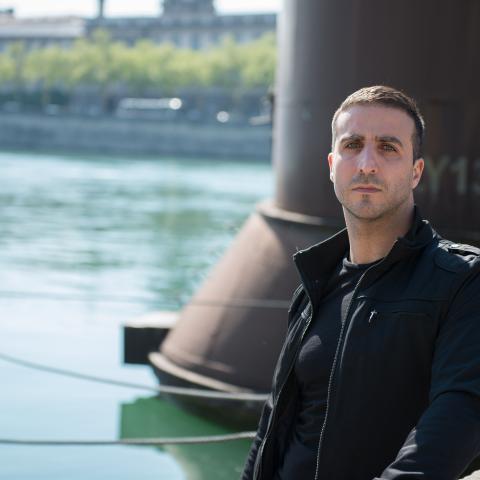

Praised by the New York Times as “a gifted Brazilian-American modernist” whose works are “brilliantly realized”, “technically formidable, wildly varied”, and possess “voluptuous, elemental lyricism”, Felipe Lara’s work — which includes orchestral, chamber, vocal, film, electroacoustic, and popular music — engages in producing new musical contexts by means of (re)interpreting and translating acoustical and extra-musical properties of familiar source sonorities into project-specific forces. He often aspires to create self-similar relationships between the macro and micro-articulation of the musical experience and highlights the interdependence of acoustic music composition and technology.
His music has been recently commissioned by leading soloists, ensembles, and institutions such as the Arditti Quartet (with ExperimentalStudio Freiburg SWR), Brentano Quartet (with Hsin-Yung Huang), Claire Chase, Conrad Tao, Donaueschinger Musiktage, Duo Diorama, Ensemble InterContemporain, Ensemble Modern, Helsinki Philharmonic Orchestra, International Contemporary Ensemble, Los Angeles Philharmonic, Ogni Suono, Rebekah Heller, and São Paulo Symphony Orchestra (Osesp), as well as performed by the Amazonas Philharmonic, Asasello Quartet, Ensemble Recherche, David Fulmer, Dirk Kaftan, Esperanza Spalding, Ex Novo Ensemble, Ilan Volkov, JACK Quartet, Kammerensemble Neue Musik Berlin, Mivos Quartet, Neil Thomson, Netherlands Radio Chamber Philharmonic Hilversum, Nouvel Ensemble Moderne, Peter Eötvös, Steven Schick, Susanna Mällki, Talea Ensemble, and the Tanglewood Music Center Orchestra.
His compositions have been presented by festivals and venues such as Aspen Music Festival, Centre Acanthes (Metz), Acht Brücken Festival (Kölner Philharmonie), Aldeburgh Music Festival (UK), Ars Musica (Belgium), The Art Institute of Chicago, Aspekte Festival (Salzburg), Asphalt Festival (Düsseldorf), Budapest Music Center, Carnegie Hall Neighborhood Concerts, Crested Butte Music Festival, Darmstadt International Courses for New Music, Donaueschinger Musiktage, Europalia (Belgium), Festival Música Nova (São Paulo), Fromm Players at Harvard, Hakuju Hall (Tokyo), Heidelberger Frühling, Huddersfield Contemporary Music Festival (UK), King’s Place (London), The Kitchen (New York), Luxembourg Philharmonie, Lincoln Center’s Mostly Mozart Festival (New York), Musikfest Frankfurt, New York Philharmonic Biennial, Pan Music Festival (ISCM, South Korea), Philharmonie de Paris, Phillips Collection (Washington, DC), Roulette (Brooklyn), Sala São Paulo (Brazil), Sala Cecília Meireles (Rio de Janeiro), Southbank Centre’s Queen Elizabeth Hall (London), Tanglewood’s Festival for Contemporary Music, Tanglewood’s Great Performers Series, Teatro Amazonas (Manaus), Teatro La Fenice (Venice), Theatro Municipal (São Paulo), and TimeSpans Festival (New York).
The recipient of a 2015 Radcliffe Institute for Advanced Study Fellowship, from Harvard University, he has been awarded a Johns Hopkins Catalyst Award (2021), Prêmio Concerto (São Paulo, 2021), New Jersey Council for the Arts Fellowship (2020), an invitational fellowship from the Civitella Ranieri Foundation (2014), composition prize from Funarte (Brazilian Ministry of Culture, 2014), Master Artist Award from the National Association of Latino Arts and Culture (2013), Kanter/Mivos String Quartet Prize (2011), Staubach Prize from IMD (Darmstadt, 2008), Dal Niente International Call-for-Scores, First Prize in Orchestra Composition from the Biennial for Brazilian Contemporary Music (2005), as well as commissions from Chamber Music America (2021), Koussevitzky Music Foundation at Library of Congress (2016), and Fromm Music Foundation at Harvard University (2011). He was also a finalist for the 2014 Rolex Mentor and Protégé Arts Initiative (Geneva, 2014).
Recent recordings include Parábolas na Caverna and Meditation and Calligraphy on Claire Chase’s Density 2036 (Berkeley, Meyer Sound 2020), Metafagote on Rebekah Heller’s album also titled Metafagote (New York, Tundra Records, 2017), Tran(slate) on JACK Quartet/Áltavoz composers (New York, New Focus Recordings 2014) and Progetto Prometeo – omaggio a Luigi Nono ed Emilio Vedova by Ex Novo Ensemble (Venice, Rosenfinger 2009), Corde Vocale on Mivos Quartet’s Reappearances (New York, Carrier Records 2013), Corde Vocale by Arditti Quartet and Prisma by Duo Diorama on Quatro Visões Contemporâneas na Música Paulista (Campinas, Gravina 2008), and Sonata de Desintoxicação on Karin Fernandes’ Cria, which was awarded ‘album of the year’ by Brazilian Revista Concerto (São Paulo, Proac 2014).
He holds a PhD in Music Composition from New York University (Graduate Scholl of Arts and Science) where he was a Henry M. MacCracken Fellow, a Masters of Music from Tufts University, and a Bachelors of Music degree from Berklee College of Music. His main teachers were Louis Karchin, Tristan Murail, Mario Davidovsky, John McDonald, Vuk Kulenovic, and Alla Elana Cohen. Additionally, he had lessons with Brian Ferneyhough, Chaya Czernowin, David Rakowski, Helmut Lachenmann, Kaija Saariaho, Marco Stroppa, Michel Jarrell, Philippe Leroux, and Wolfgang Rihm, privately and in international festivals and academies such as the Atlantic Center for the Arts, Centre Acanthes, Darmstadt, Domaine Forget, Hindemith Institute, and June in Buffalo.
Lara is an Assistant Professor in Music Composition at Johns Hopkins University’s Peabody Institute. Having previously taught at Boston Conservatory at Berklee and Faculty of Arts and Science at New York University, he has been Visiting Lecturer at Harvard’s Department of Music, where he was awarded two Harvard Excellence in Teaching Awards (2017, 2019), as well as Visiting Faculty at Federal University of Bahia (Salvador, Brazil).
Future engagements include performances of Double Concerto for Esperanza Spalding, Claire Chase, and large symphony orchestra by the Los Angeles Philharmonic (2023) and New York Philharmonic (2023), both led by Susanna Mälkki, a Miller Theater Composer Portrait performed by the International Contemporary Ensemble and conductor Vimbayi Kaziboni (2022), as well as the world premiere of a new large scale work for string quartet for the Parker Quartet, commissioned by Chamber Music America (2022).
Faculty
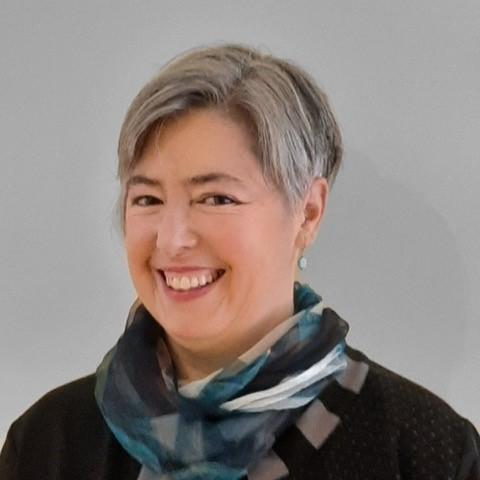

Susan Sinclair
Susan Sinclair teaches the Alexander Technique and the Pilates Method in her Toronto studio, directs the Sinclair Studio Alexander Technique Teacher Training program, and trains Pilates teachers.
Susan is on faculty at the Tokyo School for the Alexander Technique, the Houston School for the Alexander Technique and has taught for the Alexander Alliance Training in the USA, Germany and Japan.
Sinclair teaches at Toronto Dance Theater, is guest faculty at The Gestalt Institute of Toronto, and has taught courses at Humber College, Center for Indigenous Theater, Equity Showcase Theater, and in workshops to University of Toronto, Western University, and Temple University.
Sinclair presented her work at the Eighth and Ninth International Congresses of the Alexander Technique in Lugano Switzerland, and regularly teaches at Alexander Technique International conferences in Europe, USA, Canada and Japan.
Susan graduated from the Alexander Foundation, Philadelphia, School of the Toronto Dance Theater, and Ryerson Polytechnical Institute.
Since 1990, Susan has developed a unique combination of the Alexander Technique and her own Pilates-evolved method, and worked with many musicians, dancers and actors for voice production, performance enhancement, injury prevention and recovery, and physical conditioning.
Faculty
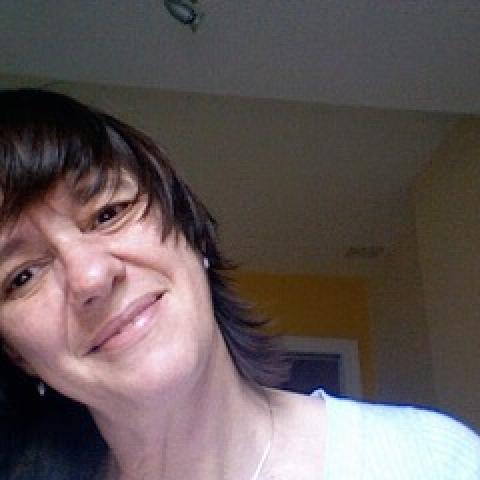

Caroline Hollway
Caroline has spent the best part of 35 years in the arts, as stage manager, production and technical manager, education manager, project manager and producer in UK and Canada.
It has taken her into community arts and human circuses in South London; large parades with boats, cars and bicycles made of sticky tape; giant puppets in Portugal; too many events in soggy fields; touring round the Scottish Highlands; running two theatres for young people in Wales; enjoying fireworks and tugs (fortunately at the same time); Operas with elephants; Touring a multimedia theatre/opera production (Constantinople - Christos Hatzis + Gryphon Trio; What’s Classical? festival weekends; Producer with Luminato Festival over the years; Performances with 1000 performers (Apocalypsis - R Murray Schafer); Night time illuminated walks in Canadian National Parks (Banff and Rouge) (Illuminations); Multiple choirs on a pond (Maada’ooki Songlines – C Derksen) and Community presentations (Odaabanag-with music by Melody McKiver - Jumblies Theatre)
She has one simple, but passionate, aim - to introduce people, especially young people, to the live arts as creators and participants, as well as spectators.
Artistic Producer
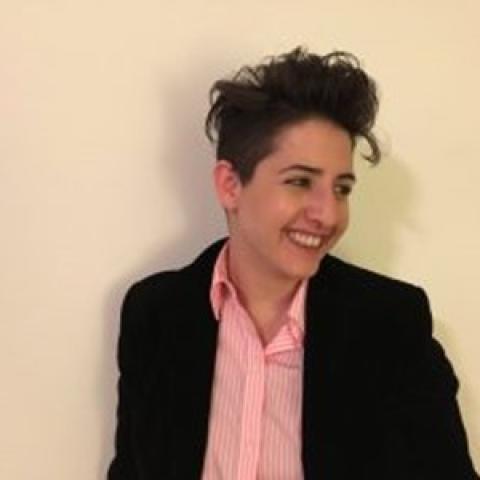

Fay Nass
Fay Nass is a Vancouver based theatre director, curator, dramaturg, producer and multi-disciplinary artist. She is Artistic Director of the frank theatre company and the founder/AD of Aphotic Theatre. Their work often examines questions of race, sex, and culture, and the challenges these pose to notions of identity. Being an Iranian-Canadian immigrant and a non-binary queer artist, in their work they shine light on liminal spaces in order to shift meanings and create space for cultural exchanges. Fay has been working as a director, dramaturg, writer, producer, curator, educator and consultant for the past 15 years in Vancouver. Her most recent credits include: co-directing Trans Script Part I: The Women (The Frank Theatre and Zee Theatre at Firehall Arts Centre) directing She Mami Wata & the Pussy WitchHunt (the Frank Theatre at PuSh Festival 2020), co-directing Straight White Men (ITSAZOO productions at Gateway Theatre), dramaturgy of Camera Obscura (Hungry Ghosts) (The Frank Theatre & QAF), directing and devising Diaspora: Queer immigrant and refugee stories (The Frank Theatre at QAF). Fay holds a MFA from Simon Fraser University. Currently, they are doing the Artistic Leadership Residency at the National Theatre School of Canada.
Faculty
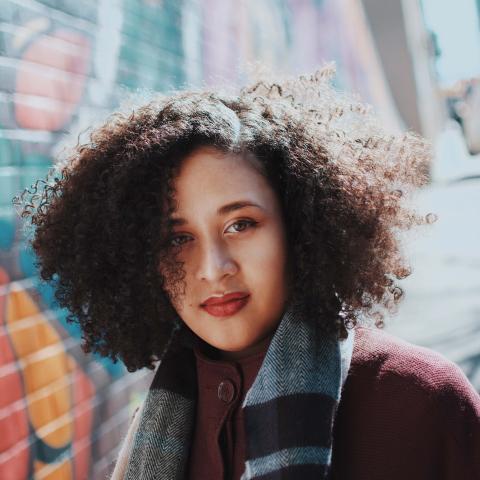

Alyssa Regent
Alyssa Regent (b. 1995) was born on the islands of Guadeloupe (FR) and studied at Hunter College New York, where she obtained a Bachelor of Arts in composition. In 2021 she was a Fromm Foundation Fellow at the 77th Composers’ Conference in Boston, MA. In 2022, she obtained her Master of Arts in composition under Suzanne Farrin and David Fulmer. During her time at Hunter College, she trained as a conductor under David Fulmer and was the Assistant conductor of the Hunter Symphony Orchestra. Alyssa’s music draws inspiration from folklore and the broader realm of art (visual art, written and spoken word, film, movement, sound art, etc.) as an approach on how to experience the affect or emotive power present within the make-up of music and the spectrum of human emotions and sensibilities.
Her music has been performed by the Talea Ensemble, Intercontemporary Ensemble, NMK Ensemble and soloists such as Connor Hanick, Erin Gee and Emi Fergusson, among others. She will begin her DMA studies this Fall at Columbia University.
Alyssa Regent is generously supported by the Canadian Pacific Hotels Endowment (Centre for Arts).
Participant Composer
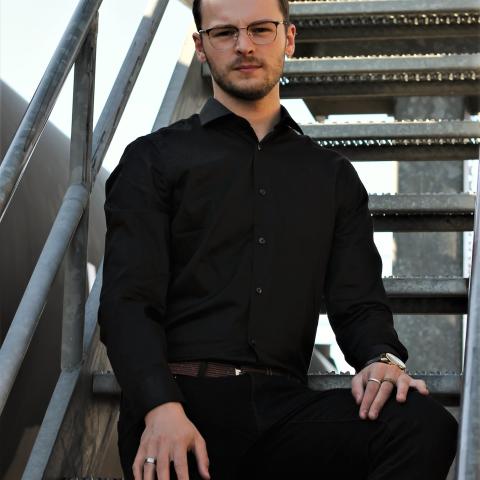

Ethan Hill
Ethan Hill is a musician and composer from western Canada. His recent works are rooted in the logic of acoustic just intonation and lead by his deep curiosity for artistic intuition. Fascinated by nature and metaphysics, he often finds himself considering these fields’ analogies to and roles in the arts. Recently, he has been exploring research in attention; how it leads us through daily life, its role in the arts and how we can employ it to uncover ever more discrete sonic worlds.
He studied composition at the University of Victoria, where he also trained as a liturgical musician at St. John the Divine Anglican Church. In 2019, he relocated to Montreal to study the organ at McGill University, during which time he held an organ scholarship at Christ Church Cathedral. He is currently based in Calgary, where he has the pleasure of working with the Alberta Ballet, the University of Calgary, choral ensembles and churches, and dedicates his free time to his personal creative endeavors.
Ethan Hill is generously supported by the Canadian Pacific Hotels Endowment (Centre for Arts).
Participant Composer
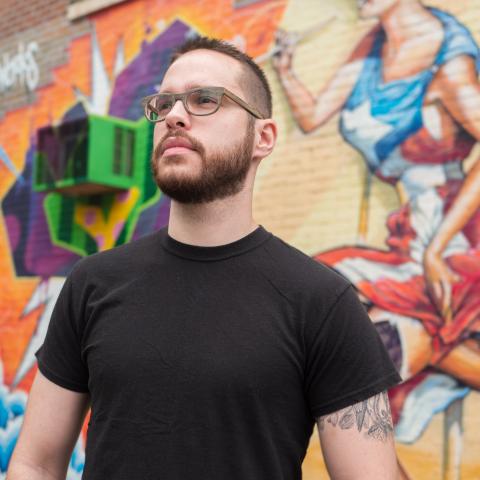

Gabriel Bouche Caro
Gabriel Bouche Caro is a Puerto Rican composer based in New York City. Gabriel explores concepts and perceptions of personal and musical identity through language and the experience of life as part of a colonized people and society. Identity, authenticity in a non-native environment, and foreignness are all tints that color the artistic conception and eventual discourse that is communicated in his work. His music has been performed in North America, South America, the Caribbean, Europe and Asia. Gabriel's music has been featured in the Havana Contemporary Music festival, soundSCAPE and New Music on the Point festivals. He has been commissioned by the Baltimore Classical Guitar Society, the Canvasounds Collective, the Massachusetts International Festival of the Arts, the Peabody Institute and Americas Society (ongoing). His music has been performed and recorded by various ensembles and soloists including the JACK Quartet, Victory Players, Evan Runyon, Gleb Kanasevich, Clare Monfredo and Eric Schultz. He is the recipient of the Randolph S. Rothschild Award in Composition (Peabody Institute), and the Augusto Rodriguez Prize for musical achievement (University of Puerto Rico). Gabriel holds an MM in Composition from the Peabody Conservatory and a BA in Music from the University of Puerto Rico. Currently Gabriel is a PhD candidate at the CUNY Graduate Center.
Gabriel Bouche Caro is generously supported by the Jeanne and Peter Lougheed Endowment.
Participant Composer
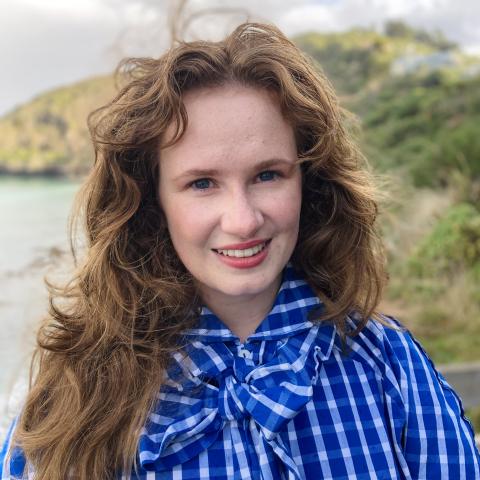

Ihlara McIndoe
Ihlara McIndoe (she/her, b.1997) is a composer from Ōtepoti/Dunedin, Aotearoa/New Zealand, whose work has been performed across Aotearoa, Australia, and Japan. In all her creative work, Ihlara prioritises two interconnected themes: preservation, and exploration. She strives to consistently question what these themes mean to her as composer, musicologist, and performer, and how critical reflection of these themes can help to better support a sustainable, inclusive music industry, particularly in genres with complex ongoing artistic and social legacies.
Ihlara’s most recent works have been written as part of her relationship with the Antarctic Heritage Trust, following the opportunity to kayak on the Antarctic Peninsula and developing a series of compositions to share across Aotearoa to encourage the spirit of exploration. Her major piece from this project was performed by the New Zealand National Youth Orchestra and members of the New Zealand Symphony Orchestra in 2021, as part of her role as National Youth Orchestra Composer in Residence.
A practising lawyer in public law and litigation, Ihlara has a keen interest in the roles and responsibilities of statutorily created arts organisations, and will be commencing her graduate music studies drawing from this interest at McGill University in the Fall, alongside continuing her compositional development.
Ihlara McIndoe is generously supported by the John Linn Memorial Endowment.
Participant Composer
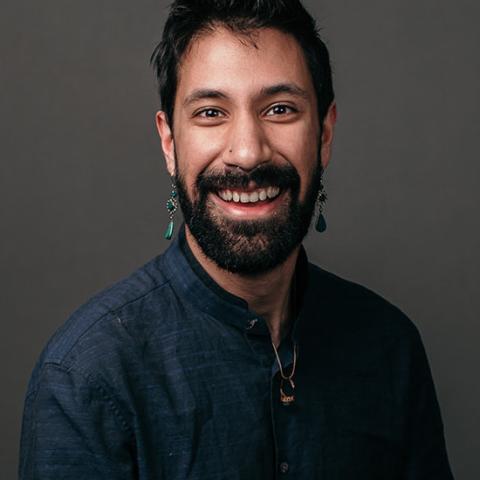

Seare Farhat
Seare Farhat strives to create music that connects a listener to the visceral imagination, energy, and transformation within narrative forms. Starting out his musical endeavors in Afghan folk music, he later built on these valued experiences in the western classical tradition combined with other interests, such as mathematics. Seare has received commissions from the JACK Quartet, IU New Music Ensemble, Metropolitan Youth Symphony, Quintessence Wind Quintet, and the Oberlin Sinfonietta, and served as the young composer-in-residence of the Detroit Chamber Winds and Strings in 2019. He has received honors such as FLUX Quartet's 2019 call for scores and being a finalist for Kaleidoscope Chamber Orchestra's 2019 call for scores. Seare has also held residencies at Avaloch Farm Music Institute in 2022 and with the Gabriela Lena Frank Creative Academy of Music as a Balhest Eeble Composer Fellow for the 2021-23 cycle. Seare holds a B.M. in Composition and B.A. in Mathematics from Oberlin College and Conservatory, a master’s degree from Indiana University Jacobs School of Music, where he held the position of Assistant Director of the New Music Ensemble, and is currently pursuing a D.M.A. at Cornell University studying with Elizabeth Ogonek, Kevin Ernste, and Marianthi Papalexandri-Alexandri.
Seare Farhat is generously supported by the John Linn Memorial Endowment.
Participant Composer
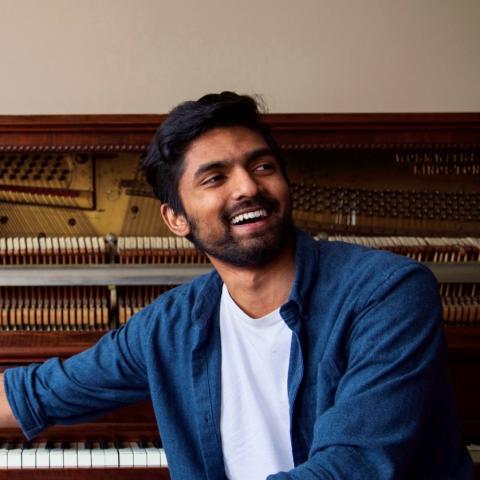

Kalaisan Kalaichelvan
Kalaisan Kalaichelvan is a composer and pianist based in Toronto, Canada. His compositional practice spans multiple disciplines, drawing from film, dance, theatre, installation and deals with themes of translation and transference.
Named by Ludwig Van as one of “six emerging Canadian composers to keep an eye on”, his music has been performed and premiered by renowned ensembles such as Pro Coro Canada, the Dior Quartet and Duo Concertante. Kalaisan is a 2021 Fellow of the Sundance Composers lab and is one of the awarded grantees of the Sundance Institute’s Art of Practice Fellowship. He has held residency at the Banff Centre for Arts and Creativity and was an alumna of the Canadian Film Centre as one of the 2021 Slaight Music residents. He was also recently awarded the Creativity Connection Fellowship with Toronto Metropolitan University and was one of the six composers commissioned by the Canadian League of Composers to write for Pro Coro Canada under their PIVOT program. In 2022, Kalaisan has scored feature films that have premiered at the Toronto International Film Festival (“This Place”) and the Fantasia Film Festival (“The Protector”).
Kalaisan’s music is defined by its genre-bending boldness, its refined classicism and musical ingenuity. Having worked across various disciplines and communities of thought, Kalaisan seeks to bring together incongruous institutions to build novel structures that reflect his artistic upbringing.
Participant Composer


Treske Quartet
The Treske Quartet — Mollie Wrafter, violin; Oliver Baily, violin; Abigail Hammett, viola; Louis Baily, cello
The Treske Quartet was formed in North Yorkshire, UK in 2017 and, although now based in Manchester, still plays an active role in delivering high quality chamber music in the area. Over the past two years the quartet has given recitals in the UK and abroad, notably the Ryedale Festival, Wye Valley Summer Festival, Llandeilo International Music Festival, and the New Generation Festival in Florence. They performed in the semi-final round of the 2022 Royal Overseas League String Ensemble competition in London, and have received coaching from some of the world's leading chamber musicians including members of the Chilingirian Quartet and Brodsky Quartet.
Passionate about contemporary and new music, the quartet enjoys collaborating with composers, performing, and recording their work. Over the past two years Treske has been working with Cumbria based composer Edward Cowie and will be recording his 9th String Quartet and Double String Quartet in collaboration with the Kreutzer Quartet for the Divine Arts record label. They have also worked with Manchester composer Claire Roberts on numerous chamber and vocal works.
The Treske Quartet is generously supported by the MacLachlan Ridge Family Endowment and the Michelle Milne Artist Award.
Participant Quartet
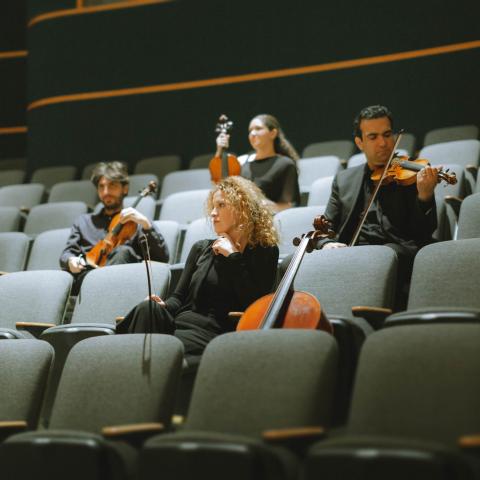

Vaughan Quartet
The Vaughan String Quartet — Vladimir Rufino, violin; Mattia Berrini, violin; Fabiola Amorim, viola; Silvia Buttiglione, cello.
Lauded by the press for its “youthful energy, seasoned experience, invigorating playing and soulful interpretations”, the Vaughan String Quartet is one of the most active young chamber music groups in Canada. Past engagements include performances for the Banff Centre for performing Arts, Edmonton Recital Society, Edmonton Opera, New Music Edmonton, the Western Canadian Music Awards, and the St. Albert Chamber Music Recital Series. The Vaughan has collaborated with a number of artists including classical accordionist Antonio Peruch, pianists Sarah Ho and Janet Scott-Hoyt, violinist Laura Andriani, and cellist Rafael Hoekman. The group has received reviews from the Edmonton Journal and the St. Albert Gazette, and has appeared on live radio (CBC Radio Canada) and television (City TV, L’Alberta en Bref, and France 3 Franche-Comté). The quartet has been coached by members of prominent North American string quartets such as the Cecilia, the St. Lawrence, the Lafayette, the Dover, and the Penderecki, as well as by world-renowned musicians including Gerald Stanick, Laura Andriani, Jonathan Crow, Robert Bardston, and Petr Holman. In 2014 the Vaughan String Quartet was Artist in Residence at the Banff Centre. A recipient of the Luminato Festival String Quartet Fellowship in Toronto, the group was part of Murray Schafer’s “Apocalypsis”, recorded live by CBC in 2015 and released on CD in 2016 by Analekta. In 2017 the group participated in the St. Lawrence String Quartet Chamber Music Seminar at Stanford University. Since 2013 the Vaughan String Quartet has organized a concert series in Edmonton, inviting musicians from across Canada and abroad, and has received a number of grants and awards from the Edmonton Arts Council, including the Cultural Diversity Award in 2017. The quartet’s debut on the international stage took place in New York City in the summer of 2015 under the sponsorship of the PAMAR (Pan American Musical Art Research). In the summer of 2016, the ensemble held its European debut at the FIMU festival in Belfort, France and continued on to perform in various cities in Northern Italy. This intense performance schedule has brought the Vaughan String Quartet to some of the most important concert halls in North America such as the Winspear Centre in Edmonton (AB), the Festival Hall in Calgary (AB), the Rolston Hall at the Banff Centre (AB), Philip T. Young Hall in Victoria (BC), the Sony Centre in Toronto (ON), Munson Recital Hall at Azusa Pacific University (CA), Campbell Hall in Stanford (CA), and the Symphony Space in New York (NY). The Vaughan String Quartet is also very engaged in the community: they regularly perform in hospitals, senior centres, schools and have been involved in concerts for people in the autism spectrum.
The Vaughan String Quartet is generously supported by the Gladys and Merrill Muttart Foundation Endowment.
Participant Quartet
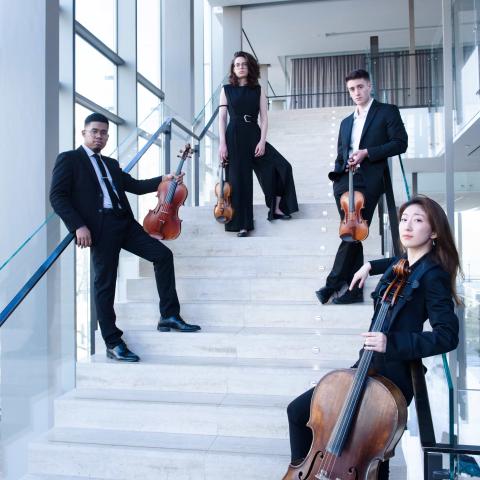

Dior Quartet
Noa Sarid, violin
Tobias Elser, violin
Caleb Georges, viola
Joanne Yesol Choi, cello
Joined together from Israel, Korea-Canada, Saint Lucia, and the USA, the Dior Quartet is the Quartet-in-Residence at the Glenn Gould School, Royal Conservatory of Music in Toronto, Canada. Formed in Fall 2018 at the Jacobs School of Music, Indiana University under the Pacifica Quartet, they are Silver prize winners of the 2021 Chesapeake Chamber Music Competition, quarter-finalists of the 2022 Banff International String Quartet Competition and 2021 Bartok Competition, and Bronze Medalists of the 2019 Fischoff Chamber Music Competition. The Dior Quartet has performed and participated in various programs and concert series in Canada, USA, and the U.K. The repertoire and projects they pursue intersect with their multicultural backgrounds and moral values, as they seek to explore the immigrant experience through art. The quartet takes their name from the French word “D’or” which means gold. The quartet has been selected to participate in the prestigious 2023 Melbourne International Chamber Music Competition and 2023 Bad Tolz 1st International String Quartet Competition.
Participant Quartet
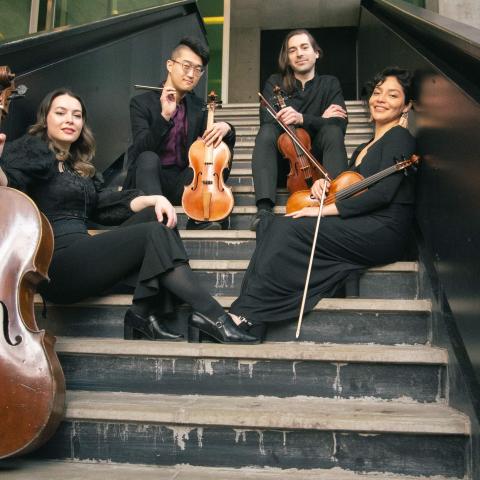

Ximenez Quartet
Ximenez Quartet — Karin Cuellar Rendon, violin; Simon Alexandre, violin; Namgon Lee, viola; Jessica Korotkin, cello
Named after 19th century Peruvian-Bolivian composer Pedro Ximenez Abril Tirado (1784-1856), the Ximenez Quartet was born in the fall of 2019 out of the shared passion for exploring music by lesser-known composers, especially those from the Americas. Montreal based and McGill University students Karin Cuellar (Bolivia), Simon Alexandre (Canada), Namgon Lee (South Korea), and Jessica Korotkin (USA) have made their mission to bring this repertoire to the concert platform in a sensitive, historically informed, and contextualized manner that aims to place this music in equal terms with music from the canonic, mostly euro-centered repertoire. In addition to exploring South American music, the Ximenez Quartet has performed repertoire ranging from classical to contemporary while integrating performance practice methods inspired by recent scholarship. The Ximenez Quartet was featured as a guest ensemble with the esteemed music series at the McCord Museum in Montreal. In addition, the Ximenez Quartet has curated concerts at the Schulich School of Music’s 5 a 7 series as well as with the Baroque Orchestra of Colorado’s “Confluences” series. Most recently, the Ximenez Quartet was the only Canadian ensemble participating in Latin America’s most prominent baroque festival, the "XIII Festival Internacional de Musica Barroca y Renacentista Misiones de Chiquitos” in Bolivia. Upcoming engagements include a concert at the 2022 Montreal Baroque Festival and the premiere of a virtual concert recorded for the 2022 Early Music America Emerging Artist Showcase.
The Ximenez Quartet is generously supported by the Finch Chamber Music Scholarship Fund.
Participant Quartet
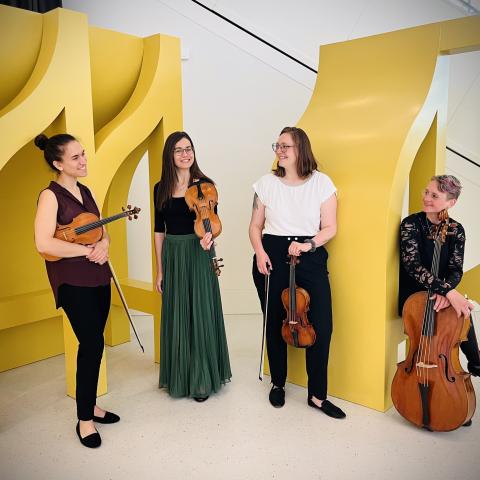

Uxor Quartet
Uxor String Quartet — Cristina Prats Costa, violin/viola | Lindsie Katz, violin/viola | Elana Cooper, violin/viola | Joanna Joy Neuschatz, cello
The Uxor Quartet is formed by four friends sharing their mutual love for historically- informed performance of string quartets. Uxor is comprised of Cristina Prats Costa(violin/viola), Lindsie Katz (violin/viola), Elana Cooper (violin/viola) and Joanna Joy Neuschatz, cello). They first met as students in 2021 at the Royal Conservatory The Hague in the Netherlands, and soon developed a passion and commitment that extended beyond their studies. As a historical string quartet, Uxor plays on gut strings with period bows based on the repertoire. In addition to baroque and classical repertoire, Uxor is excited about playing contemporary pieces and working alongside composers to create works written specifically for historical string quartets. Formed during Covid times, Uxor is very excited about future opportunities and live performances.
The Uxor Quartet is generously supported by the Finch Chamber Music Scholarship Fund.
Participant Quartet
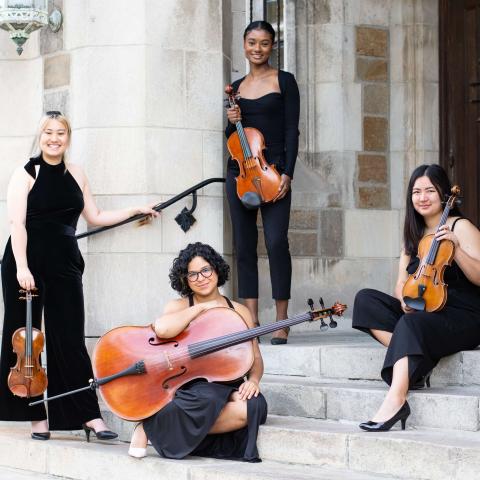

Calista Quartet
The Calista Quartet — Annamaria Vasmatzidis, violin; May Tang, violin; Harper Randolph, viola; Adalus Low-Manzini, cello
Since their formation, the Calista quartet— comprised of Annamaria Vasmatzidis and May Tang (violins), Harper Randolph (viola), and Adalus Low-Manzini (cello)— has been dedicated to performing works from both the standard quartet repertoire and by underrepresented composers. In their time together, they have had the opportunity to work closely with many esteemed chamber musicians including Amir Eldan, former member of the Oberlin Trio; Matt Albert, former member of Eighth Blackbird; and Kirsten Docter and Mari Sato, former members of the Cavani Quartet. As a quartet comprised of women of color, Calista has been especially enthusiastic to perform more contemporary works by female composers in hopes of canonizing underrepresented voices in music. In December of 2021, Calista collaborated with tenor Nicholas Phan for a digital recital presented by the University Musical Society, housed on University of Michigan’s campus. The recital featured pieces exclusively written by female composers, including Caroline Shaw and Rebecca Clarke. In Winter of 2021, Calista had the unique opportunity to record Rhiannon Giddens’ “At the Purchaser’s Option” for the University of Michigan Museum of Art’s Musical Labels.
The Calista Quartet is generously supported by the Finch Chamber Music Scholarship Fund.
Participant Quartet
Phone (Main Switchboard)
403.762.6100
Address
107 Tunnel Mountain Drive
PO Box 1020
Banff, Alberta
Canada
T1L 1H5
Follow Us
We recognize, with deep respect and gratitude, our home on the side of Sacred Buffalo Guardian Mountain. In the spirit of respect and truth, we honour and acknowledge the Banff area, known as “Minihrpa” (translated in Stoney Nakoda as “the waterfalls”) and the Treaty 7 territory and oral practices of the Îyârhe Nakoda (Stoney Nakoda) – comprised of the Bearspaw, Chiniki, and Goodstoney Nations – as well as the Tsuut’ina First Nation and the Blackfoot Confederacy comprised of the Siksika, Piikani, and Kainai. We acknowledge that this territory is home to the Shuswap Nations, Ktunaxa Nations, and Metis Nation of Alberta, Rockyview District 4. We acknowledge all Nations who live, work, and play here, help us steward this land, and honour and celebrate this place.